November 27, 2025 | 18:10 GMT +7
November 27, 2025 | 18:10 GMT +7
Hotline: 0913.378.918
November 27, 2025 | 18:10 GMT +7
Hotline: 0913.378.918
On the morning of August 29, Acting Minister of Agriculture and Environment Tran Duc Thang chaired a meeting of the Ministry's Expanded Steering Committee on the development of science and technology, innovation, digital transformation, and the implementation of Project 06.
Deputy Minister Phung Duc Tien, Standing Vice Chairman of the Committee, Deputy Minister Tran Quy Kien, Vice Chairman of the Committee, members of the Steering Committee, and leaders of subordinate units attended the meeting.
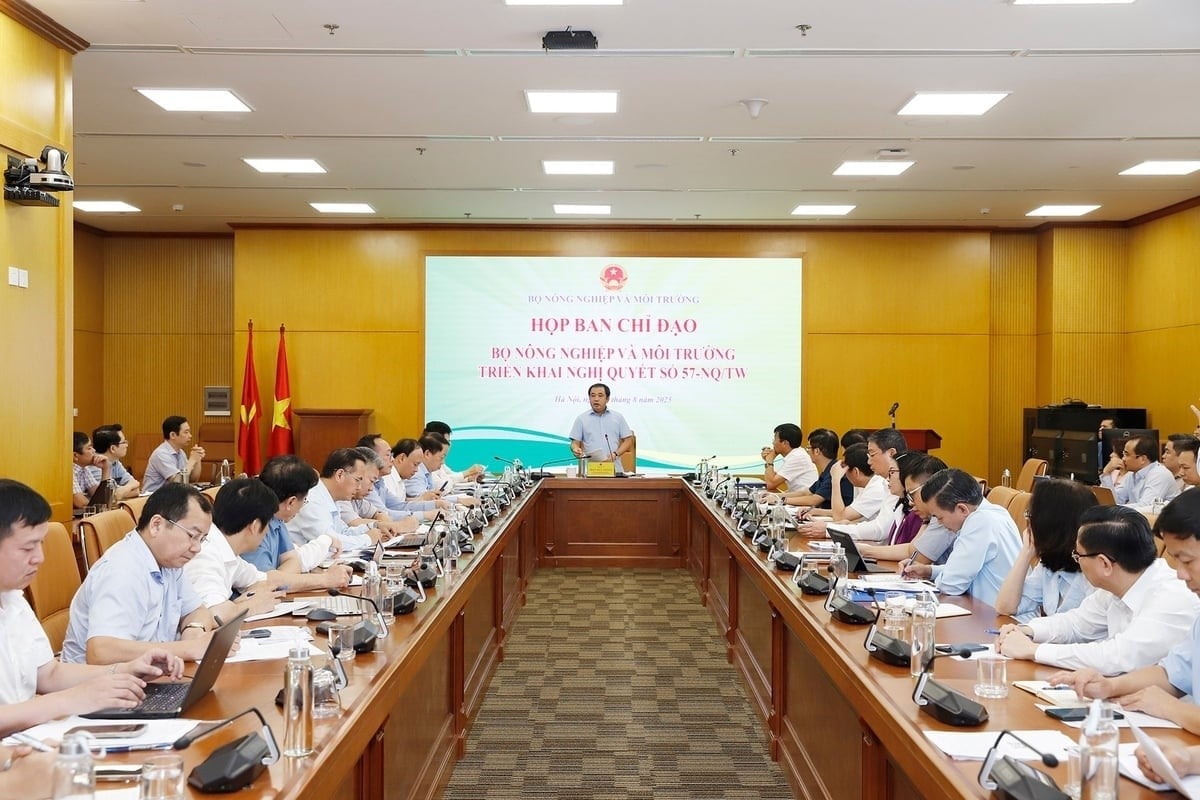
The Ministry of Agriculture and Environment (MAE)'s Expanded Steering Committee held its first meeting on the development of science and technology, innovation, digital transformation, and the implementation of Project 06. Photo: Khuong Trung.
According to the report, the Steering Committee is tasked with assisting the Minister in directing and coordinating activities related to science, technology, innovation, digital transformation, administrative reform, and the implementation of Project 06. On this basis, the Committee will directly guide the implementation of Resolution No. 57-NQ/TW of the Politburo, along with other resolutions and decisions of the National Assembly, the Government, and the Prime Minister. It is also responsible for monitoring, evaluating, reviewing, and summarizing the implementation process. Beyond internal coordination, the Committee has the responsibility to work closely with ministries, branches, and central agencies to ensure consistency and effectiveness.
Acting Minister Tran Duc Thang emphasized, "In the current phase of national development, every transformation must be based on science, technology, and innovation." He appreciated the units' sense of preparedness and responsibility but noted that some tasks have yet to meet practical requirements. Therefore, he urged the assigned units to promptly issue their action plans and avoid delays.
According to the Acting Minister, the Ministry of Agriculture and Environment (MAE) is among the agencies with strong research forces, employing more scientific officers than some academies combined. With substantial funding allocated for research, digital transformation, and information technology, it is essential to define which unit takes the lead clearly, the deadlines for completion, and which leader takes responsibility. Deputy Ministers, Directors General, Department Directors, and Institute Directors must be personally responsible for their assigned tasks.
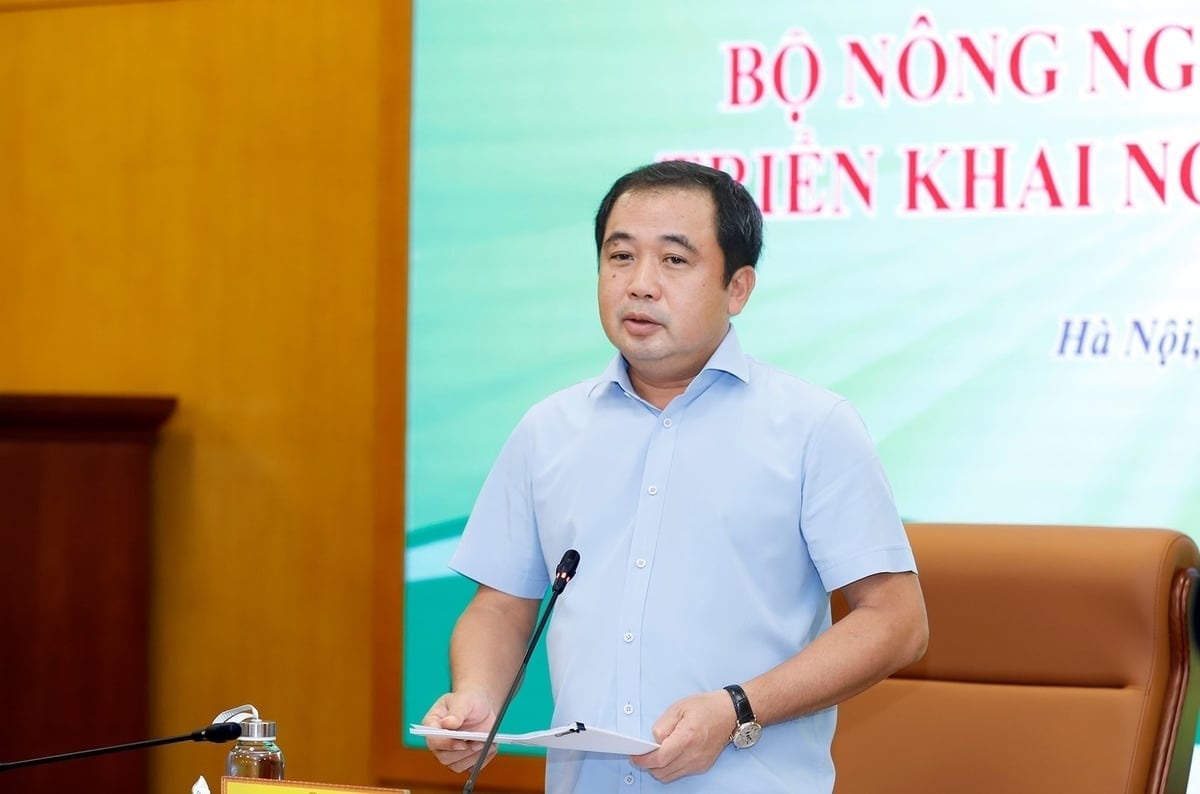
Acting Minister Tran Duc Thang emphasized, "In the current phase of national development, every transformation must be based on science, technology, and innovation." Photo: Khuong Trung.
A consolidated report showed that the Ministry has carried out the directives of the Central Government well regarding the operation of the two-tier local government system starting July 1. However, the greatest challenges remain at the commune level: limited payrolls and excessive workloads, with some localities assigning only one or two officials to handle hundreds of tasks, particularly in the land sector. According to Mr. Thang, the solution lies in leveraging technology, digital transformation, and database applications to ease the burden.
The Acting Minister also stressed the completion of the national land database. Surveying, mapping, and data updates are expected to be fundamentally finalized by 2025. If localities face funding shortages, the central government will provide additional resources.
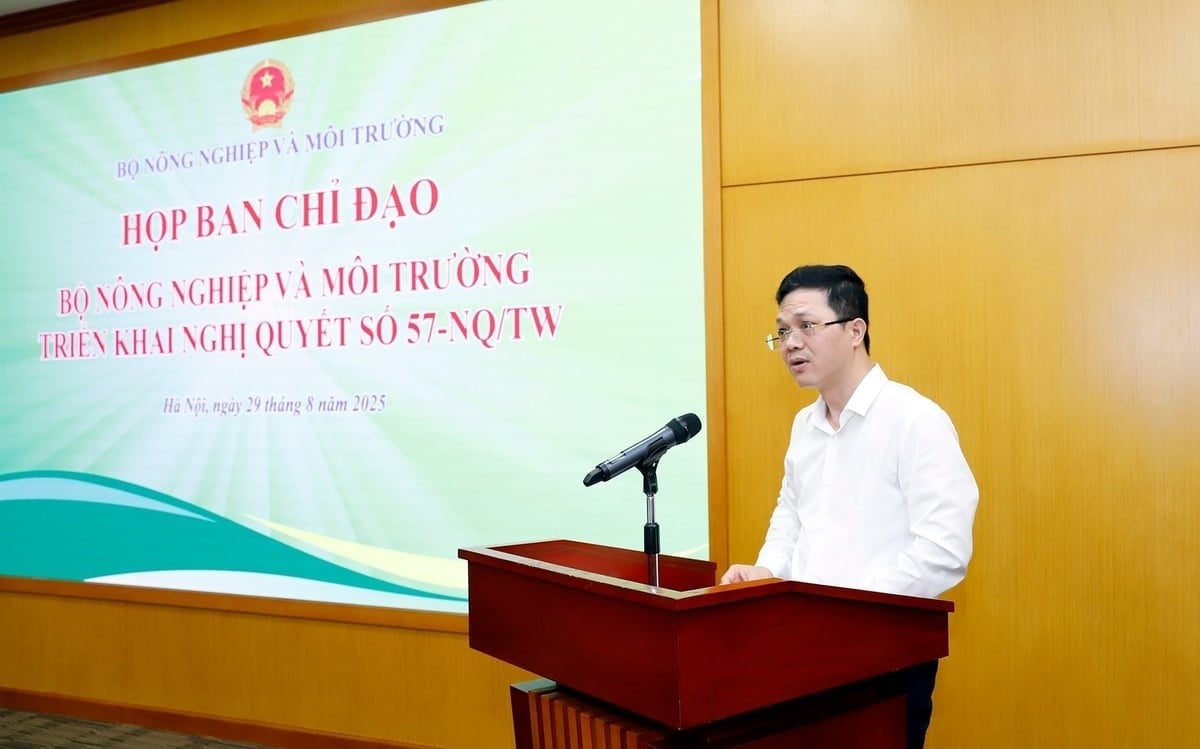
Director General of the Department of Science and Technology Nguyen Van Long delivered a report at the meeting. Photo: Khuong Trung.
In the field of scientific research, he noted that the Ministry's scientific workforce has contributed many important results to the agricultural sector, such as the development of crop varieties, livestock breeds, aquaculture species, vegetables, and fruits. However, the management and use of research funding remain subject to different opinions. Directors of institutes, departments, and divisions were requested to firmly grasp regulations and strictly follow procedures from proposal to acceptance to avoid waste.
"The key principle is that scientific research must deliver tangible products. If not, it must at least create a premise for subsequent studies." The budget cannot be spent without producing results," Acting Minister Tran Duc Thang stressed.
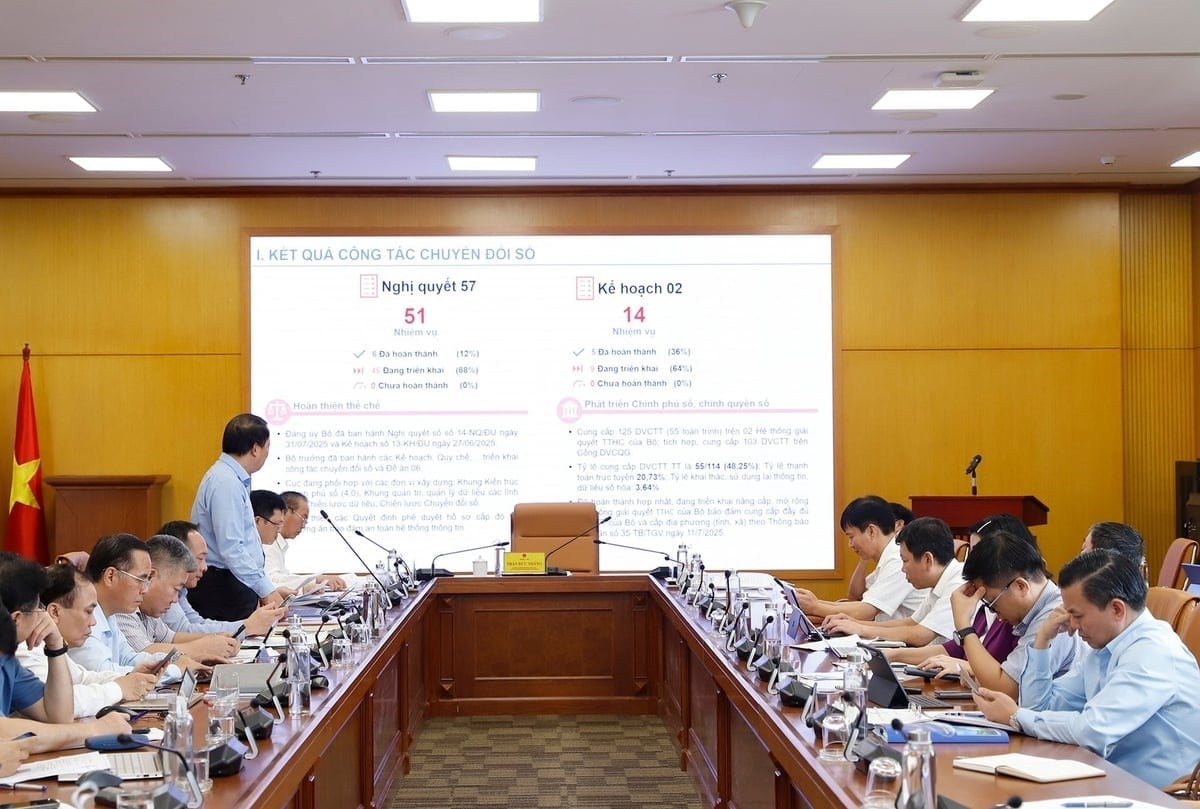
Director General of the Department of Digital Transformation Le Phu Ha presented a report at the meeting. Photo: Khuong Trung.
In terms of administrative reform, the Ministry has been highly valued by the Central Government, though certain procedures remain unreasonable. He proposed continued review and streamlining, retaining only those procedures mandated by international requirements, such as certification for goods exported to Europe and China.
"In short, the three pillars the Ministry must focus on are scientific research, digital transformation and technological application, and administrative reform. If doing well, the country will undergo comprehensive transformation, and the Ministry will continue to play a pivotal role in national development," Acting Minister Tran Duc Thang affirmed.
Deputy Minister Phung Duc Tien noted that the sector currently has 90 institutes, 33 training facilities, three key laboratories, and 11,427 researchers, including 44 professors and 4,776 scientific staff. "This is an important potential that we must continue to promote," he said.
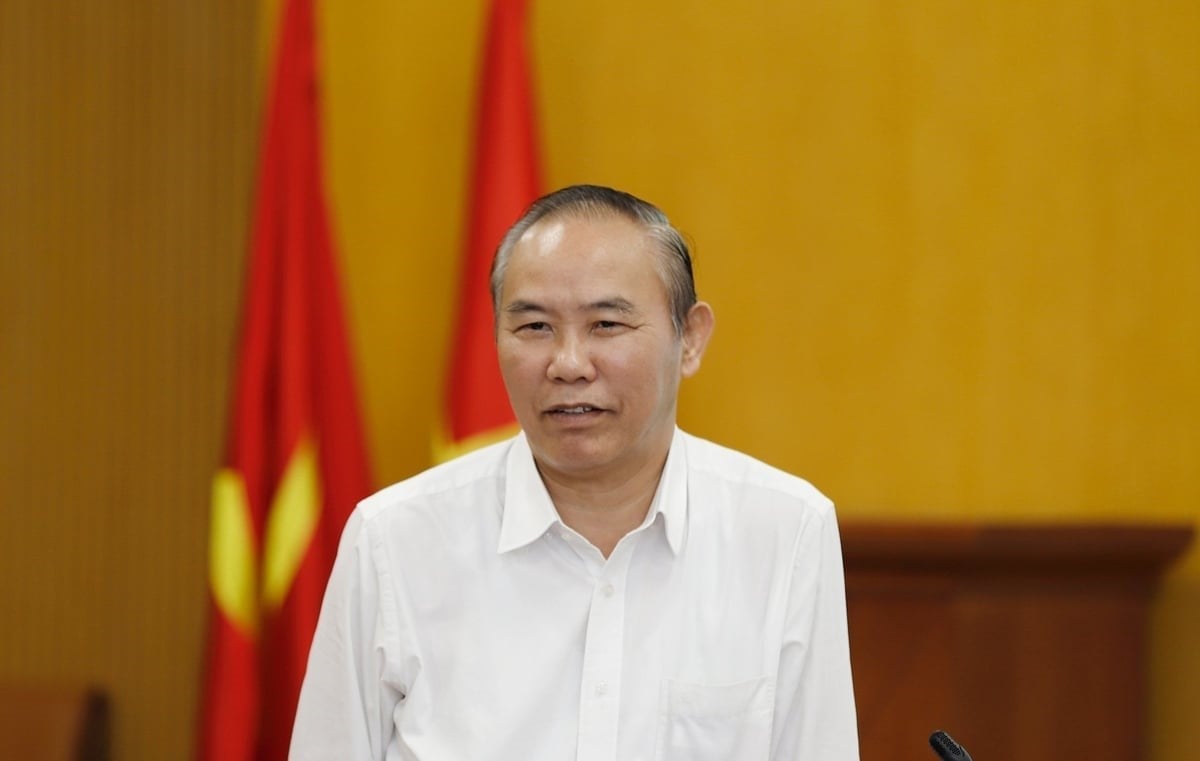
Deputy Minister Phung Duc Tien spoke at the meeting. Photo: Khuong Trung.
Scientific research tasks are implemented through a process: scientific and technological organizations propose tasks, unit leaders review them within their areas of responsibility, and finally, Deputy Ministers give the final consideration before establishing the council. As a result, the list of 52 science and technology tasks for 2026 has been finalized after public bidding, selection council establishment, and appraisal of content and funding.
In the field of natural resources and environment alone, although the 2025 quota has already been exhausted, the allocation remains higher than in 2024, with 126 tasks. The Ministry is currently finalizing its 2026 science and technology plan along with 28 programs under the new resolution, including many proposals placing greater emphasis on production, processing, and consumption rather than purely basic research.
Deputy Minister Tran Quy Kien noted that the Ministry has completed eight databases and is piloting 10 more. In 2025, priority will be given to the land and fishing vessel databases.
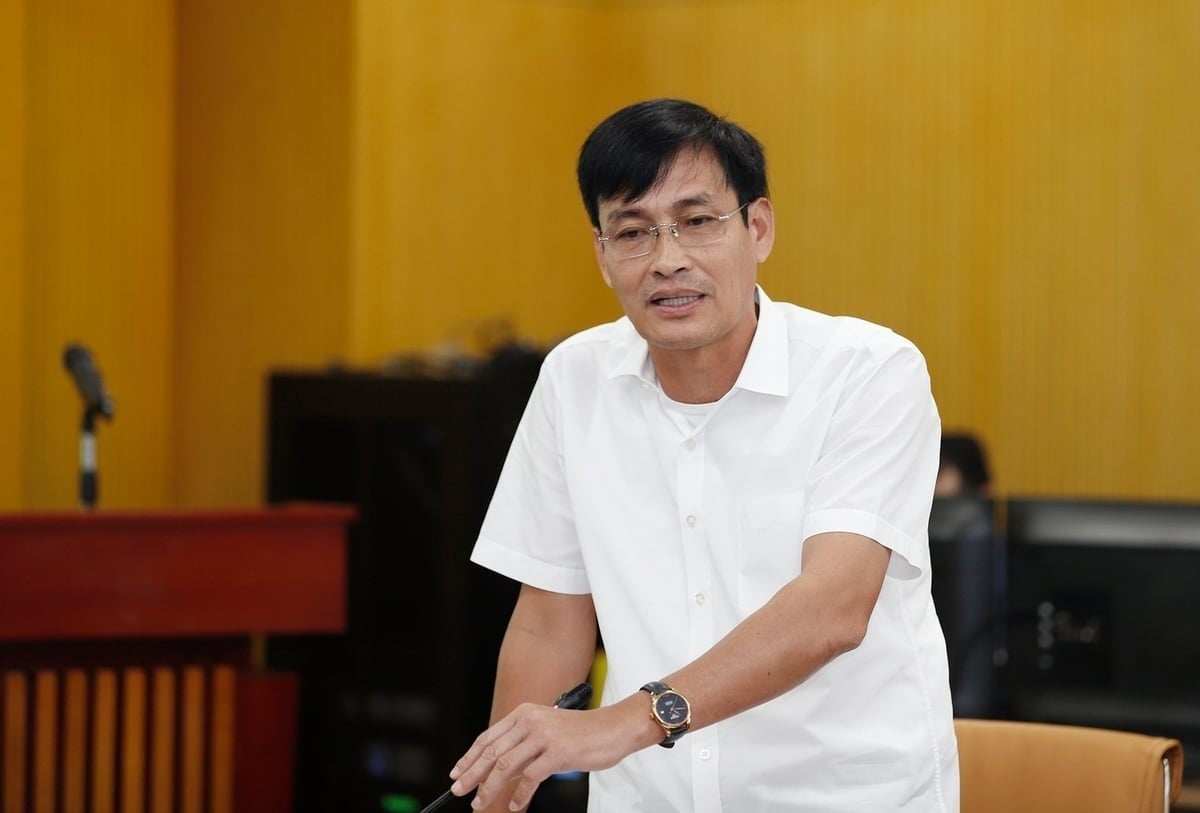
Deputy Minister Tran Quy Kien spoke at the meeting. Photo: Khuong Trung.
According to Mr. Kien, land records are basically complete, but starting in 2025, household land and housing records must be fully finalized. With more than 80,000 fishing vessels, the unification and verification of vessel owner information is essential, requiring coordination between the Ministry of Public Security and the Ministry of National Defense.
In terms of funding, Mr. Kien noted that demand is substantial while the 2025 budget remains limited. Without early budget allocations, projects will face difficulties in implementation. He also stressed that appraisal and final settlement procedures will be tightened, particularly as agriculture and environment are not prioritized sectors like defense and security.
Mr. Kien requested that one week after the Minister signed the document on September 22, all units must immediately begin implementation and provide direct feedback during sessions to finalize working regulations. "The Central Inspection Commission will closely monitor the process. Failure to comply seriously will result in strict handling," he emphasized.
Translated by Thu Huyen

(VAN) After the institutional merger, Da Nang possesses significant forest-carbon reserves and is proactively engaging in the carbon market, creating a new revenue stream.

(VAN) An Giang strengthens communication against IUU fishing, increases inspections and sanctions, and is determined to remove the EC’s “yellow card” while developing a sustainable fisheries sector.

(VAN) As green transition becomes a global trajectory, Viet Nam’s biggest challenge is not only technology and models, but how to ensure that capital flows reach the right beneficiaries.

(VAN) The Ministry of Agriculture and Environment must spearhead the construction of green governance, spanning decision-making processes and investment standards to policy evaluation mechanisms.

(VAN) The Agriculture and Environment sector of Khanh Hoa has achieved numerous milestones over the past 80 years, contributing significantly to the goal of establishing the province as a centrally governed city by 2030.

(VAN) Viet Nam is entering the pivotal period of 2025-2030, moving toward the formulation of the Remote Sensing Law, which will establish a legal foundation for the development of national digital data.

(VAN) The agricultural sector is finalizing the strategic framework for emission reduction, setting the goal of sharply cutting methane and 403.7 million tons of CO2 equivalent and moving toward Net Zero by 2050.